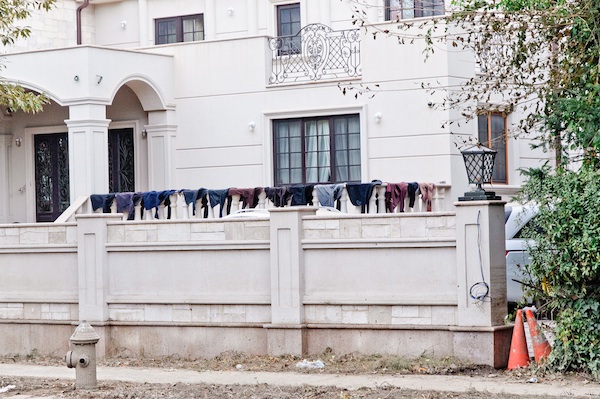
Photo by: Renata Bystritsky
In Manhattan Beach, million-dollars homes are wringing out from flooding that came from the bayside and the oceanfront.
Hurricane Sandy’s impact on Brooklyn and the rest of the metropolitan region is often understood through the lens of homeowners or renters, whose dwellings were either destroyed, or damaged or left without heat and light for weeks on end. But institutions have also taken a hit—particularly in places like Manhattan Beach.
The quiet, tree-lined streets of the south Brooklyn neighborhood lead to the Sheepshead Bay Canal on one side, and to the ocean on the other side. The suburban peninsula boasts a median home value of $1 million, the neighborhood a landscape of sprawling McMansions on large plots of land. Residents have a median household income somewhere around $80,000.
The peninsula was flooded from both sides during the storm. “Every house was flooded,” Ira Zaltman, president of the Manhattan Beach Community Group, recalls. “Every building. Every single structure in Manhattan Beach was affected. I couldn’t believe it.”
Damage to these homes ranged from one foot of water to total destruction. In the immediate aftermath of the storm, one could walk down the street and find expensive artwork, antique furniture, and pool tables piled in heaps along with sheetrock and warped ceilings lining the sidewalks in large heaps, the stench of back-up sewers emanating strongly from the debris.
Manhattan Beach is also home to a number of religious and scholastic institutions: Kingsborough Community College, the Leon M. Goldstein High School for the Sciences, Temple Bethel, and the Zichron Aryeh Leib Manhattan Beach Community Kollel are all located in Manhattan Beach. Each of these institutions was affected by the storm.
Kingsborough Community College, which shares a campus with Leon M. Goldstein High School, is located at the tip of Manhattan Beach. “You are aware that we are surrounded on three sides by water?” a spokesperson for the president’s office asks rhetorically. There was significant damage to the marina and maritime equipment. Furthermore, many of the classrooms were flooded, and debris had washed up along the campus, “even decks from people’s houses in Breezy Point,” President Regina Peruggi told TC Community. Grounds staff were able to get the college up and running within a week, but the spokesperson says it’s still too early to tell how much damage was sustained. When asked if they had applied for aid to FEMA, the spokesperson says, “It’s an ongoing process.”
The Zichron Aryeh Leib Kollel is located in the heart of Manhattan Beach, on West End Avenue. It is home to a yeshiva but it is also a synagogue for the small Orthodox community of Manhattan Beach. A Rabbi associated with the community reports that every single member of the community was affected by the storm. The building itself required significant reconstruction.
The Yeshiva moved to Flatbush until last week, when enough repairs had been completed to allow for instruction to resume. But the basement remains unrepaired, and the electricity is still spotty. FEMA does not provide aid to religious institutions, and the Kollel has had to rely on donations. “The Orthodox Union has been very generous,” the Rabbi says. “So has United Jewish Appeal. Individuals have also donated.”
As for the area’s homeowners, now that it comes to repairing the damaged basements and first floors, Zaltman says it’s been very frustrating. “People have applied to their Homeowners Insurance, to their Flooding Insurance, and to FEMA, but all have been lacking in response.” He estimates the damage to his home to be at least $100,000, but says his flood insurance will pay $20,000 at most.
Recently, the city announced a Property Tax Relief, but that is only for houses that have been demolished, or are uninhabitable. Zaltman will not benefit from this relief. “There’s a real discrimination against middle-class and upper-middle-class communities going on,” Zaltman says. “I understand it, but we still have our own issues. There’s a distinct lack of urgency from the city regarding Manhattan Beach.”







